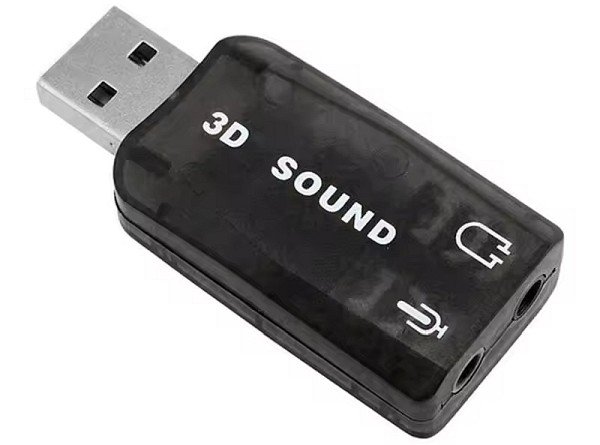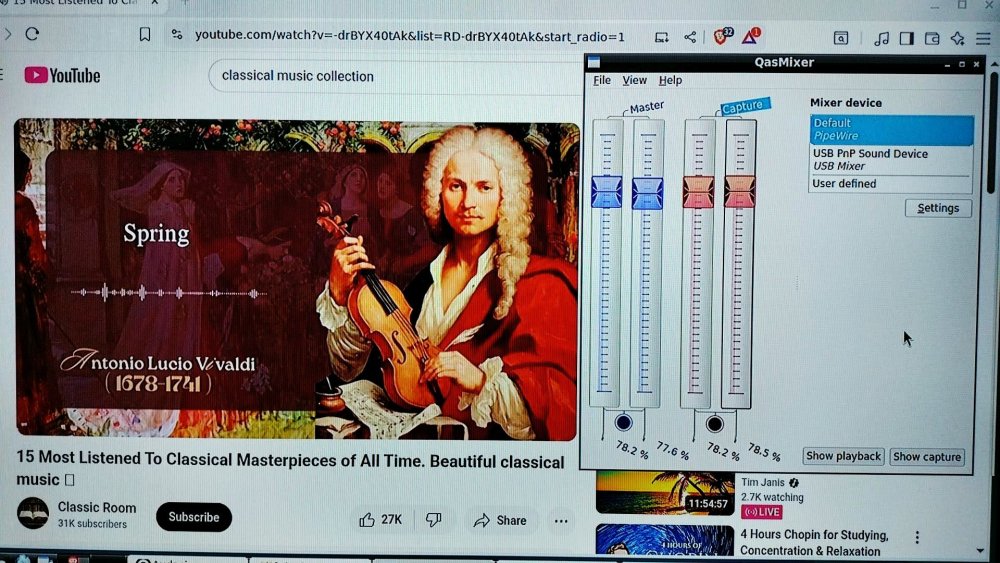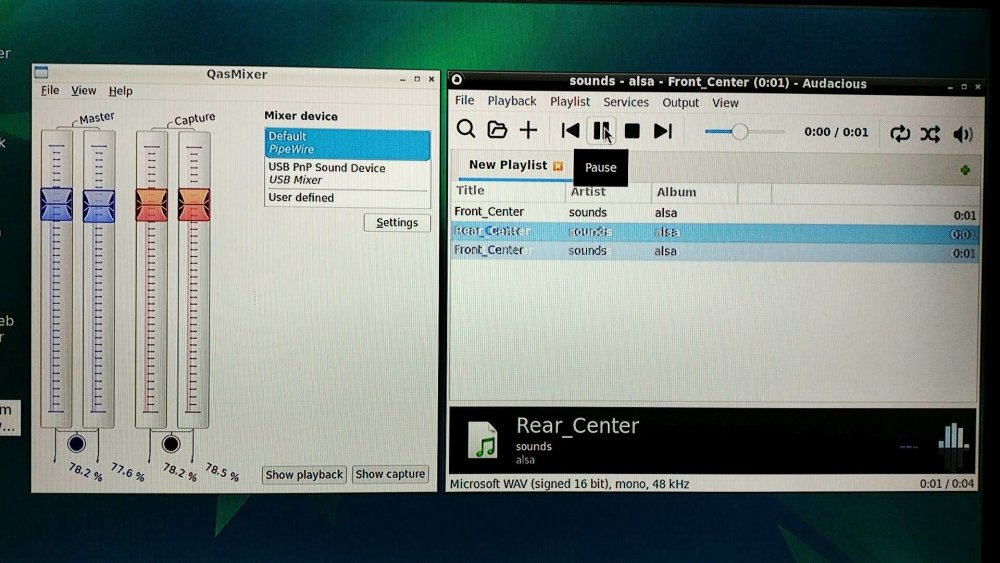All Activity
- Today
-
So my experience with Armbian is pretty broad, starting with Raspberry PI, then taking a hard left turn at Albuquerque with me successfully running a docker server on an Allwinner H3 based T95 super TV box. I’ve also run it on SBCs like the yeayeetoo Rockchip series. I’ve just never compiled a build and it is so hard to find any info from anywhere about the Armada 1500 running anything. What is the virtual system option?
-

We are ready to offer a Bountysource donation to Armbian
amazingfate replied to maximumsettings's topic in Orange Pi 5
These errors are fine because moonlight will try all the hw accel APIs like vaapi, vdpau and vulkan, but on rockchip platform we only need rkmpp decoder, as you can see in the log it is detected, - Yesterday
-

We are ready to offer a Bountysource donation to Armbian
tanod replied to maximumsettings's topic in Orange Pi 5
Hey @amazingfate, Thank you very much for the reply! I managed to build it but still a lot of errors in the log... #moonlight-qt/app/moonlight 00:00:00 - SDL Info (0): Compiled with SDL 2.30.0 00:00:00 - SDL Info (0): Running with SDL 2.30.0 00:00:00 - Qt Info: No translation available for "bg_BG" 00:00:00 - SDL Info (0): Detected Wayland 00:00:00 - Qt Warning: qrc:/gui/main.qml:13:1: QML ApplicationWindow: ToolTip must be attached to an Item 00:00:00 - Qt Info: Found "gamecontrollerdb.txt" at "/home/noone/.cache/Moonlight Game Streaming Project/Moonlight/gamecontrollerdb.txt" 00:00:00 - SDL Info (0): Loaded 335 new gamepad mappings Couldn't open plugin directory: No such file or directory No plugins found, falling back on no decorations 00:00:00 - SDL Warn (0): Failed to create test window with platform flags: Installed Vulkan doesn't implement the VK_KHR_surface extension 00:00:00 - SDL Info (0): V-sync disabled libva info: VA-API version 1.20.0 libva info: Trying to open /usr/lib/aarch64-linux-gnu/dri/rockchip_drv_video.so libva info: va_openDriver() returns -1 00:00:00 - SDL Info (0): Skipping VAAPI fallback driver names on libva 2.20+ 00:00:00 - SDL Error (0): Failed to initialize VAAPI: -1 libva info: VA-API version 1.20.0 libva info: Trying to open /usr/lib/aarch64-linux-gnu/dri/rockchip_drv_video.so libva info: va_openDriver() returns -1 00:00:00 - SDL Info (0): Skipping VAAPI fallback driver names on libva 2.20+ 00:00:00 - SDL Error (0): Failed to initialize VAAPI: -1 00:00:00 - SDL Error (0): SDL_Vulkan_GetInstanceExtensions() #1 failed: The specified window isn't a Vulkan window 00:00:00 - SDL Error (0): SDL_Vulkan_GetInstanceExtensions() #1 failed: The specified window isn't a Vulkan window 00:00:00 - SDL Info (0): Opened DRM render node: /dev/dri/renderD128 00:00:00 - SDL Info (0): GPU driver: rockchip 00:00:00 - SDL Info (0): Direct rendering via DRM is disabled 00:00:00 - SDL Error (0): SDL_Vulkan_GetInstanceExtensions() #1 failed: The specified window isn't a Vulkan window 00:00:00 - SDL Info (0): DRM backend supports exporting EGLImage 00:00:00 - SDL Info (0): EGLRenderer: EGL doesn't support HDR rendering 00:00:00 - SDL Info (0): Opened DRM render node: /dev/dri/renderD128 00:00:00 - SDL Info (0): GPU driver: rockchip 00:00:00 - SDL Info (0): Direct rendering via DRM is disabled 00:00:00 - SDL Error (0): SDL_Vulkan_GetInstanceExtensions() #1 failed: The specified window isn't a Vulkan window 00:00:00 - SDL Info (0): Trying DrmRenderer for codec hevc_rkmpp due to preferred pixel format: 0xb3 00:00:00 - SDL Info (0): Opened DRM render node: /dev/dri/renderD128 00:00:00 - SDL Info (0): GPU driver: rockchip 00:00:00 - SDL Info (0): Direct rendering via DRM is disabled 00:00:00 - SDL Error (0): SDL_Vulkan_GetInstanceExtensions() #1 failed: The specified window isn't a Vulkan window 00:00:00 - SDL Info (0): DRM backend supports exporting EGLImage 00:00:00 - SDL Info (0): EGLRenderer: EGL doesn't support HDR rendering 00:00:00 - SDL Info (0): Opened DRM render node: /dev/dri/renderD128 00:00:00 - SDL Info (0): GPU driver: rockchip 00:00:00 - SDL Info (0): Direct rendering via DRM is disabled 00:00:00 - SDL Info (0): Trying SdlRenderer for codec hevc_rkmpp due to compatible pixel format: 0xe4 00:00:00 - SDL Warn (0): No renderer can handle output from decoder: hevc_rkmpp 00:00:00 - SDL Info (0): Trying SdlRenderer for codec hevc_cuvid due to preferred pixel format: 0x9f 00:00:00 - SDL Info (0): Trying DrmRenderer for codec hevc_cuvid due to compatible pixel format: 0x9f 00:00:00 - SDL Info (0): Opened DRM render node: /dev/dri/renderD128 00:00:00 - SDL Info (0): GPU driver: rockchip 00:00:00 - SDL Info (0): Direct rendering via DRM is disabled 00:00:00 - SDL Error (0): SDL_Vulkan_GetInstanceExtensions() #1 failed: The specified window isn't a Vulkan window 00:00:00 - SDL Info (0): DRM backend supports exporting EGLImage 00:00:00 - SDL Info (0): EGLRenderer: EGL doesn't support HDR rendering 00:00:00 - SDL Info (0): Opened DRM render node: /dev/dri/renderD128 00:00:00 - SDL Info (0): GPU driver: rockchip 00:00:00 - SDL Info (0): Direct rendering via DRM is disabled 00:00:00 - SDL Info (0): Trying PlVkRenderer for codec hevc_cuvid due to compatible pixel format: 0x9f 00:00:00 - SDL Error (0): SDL_Vulkan_GetInstanceExtensions() #1 failed: The specified window isn't a Vulkan window 00:00:00 - SDL Error (0): SDL_Vulkan_GetInstanceExtensions() #1 failed: The specified window isn't a Vulkan window 00:00:00 - SDL Warn (0): No renderer can handle output from decoder: hevc_cuvid 00:00:00 - SDL Info (0): Opened DRM render node: /dev/dri/renderD128 00:00:00 - SDL Info (0): GPU driver: rockchip 00:00:00 - SDL Info (0): Direct rendering via DRM is disabled 00:00:00 - SDL Error (0): SDL_Vulkan_GetInstanceExtensions() #1 failed: The specified window isn't a Vulkan window 00:00:00 - SDL Info (0): DRM backend supports exporting EGLImage 00:00:00 - SDL Info (0): EGLRenderer: EGL doesn't support HDR rendering 00:00:00 - SDL Info (0): Opened DRM render node: /dev/dri/renderD128 00:00:00 - SDL Info (0): GPU driver: rockchip 00:00:00 - SDL Info (0): Direct rendering via DRM is disabled 00:00:00 - SDL Error (0): SDL_Vulkan_GetInstanceExtensions() #1 failed: The specified window isn't a Vulkan window 00:00:00 - SDL Info (0): Trying DrmRenderer for codec hevc_rkmpp due to preferred pixel format: 0xb3 00:00:00 - SDL Info (0): Opened DRM render node: /dev/dri/renderD128 00:00:00 - SDL Info (0): GPU driver: rockchip 00:00:00 - SDL Info (0): Direct rendering via DRM is disabled 00:00:00 - SDL Error (0): SDL_Vulkan_GetInstanceExtensions() #1 failed: The specified window isn't a Vulkan window 00:00:00 - SDL Info (0): DRM backend supports exporting EGLImage 00:00:00 - SDL Info (0): EGLRenderer: EGL doesn't support HDR rendering 00:00:00 - SDL Info (0): Opened DRM render node: /dev/dri/renderD128 00:00:00 - SDL Info (0): GPU driver: rockchip 00:00:00 - SDL Info (0): Direct rendering via DRM is disabled 00:00:00 - SDL Info (0): Trying SdlRenderer for codec hevc_rkmpp due to compatible pixel format: 0xe4 00:00:00 - SDL Warn (0): No renderer can handle output from decoder: hevc_rkmpp 00:00:00 - SDL Error (0): SDL_Vulkan_GetInstanceExtensions() #1 failed: The specified window isn't a Vulkan window 00:00:00 - SDL Error (0): SDL_Vulkan_GetInstanceExtensions() #1 failed: The specified window isn't a Vulkan window 00:00:00 - SDL Info (0): Trying SdlRenderer for codec hevc_cuvid due to preferred pixel format: 0x9f 00:00:00 - SDL Info (0): Trying DrmRenderer for codec hevc_cuvid due to compatible pixel format: 0x9f 00:00:00 - SDL Info (0): Opened DRM render node: /dev/dri/renderD128 00:00:00 - SDL Info (0): GPU driver: rockchip 00:00:00 - SDL Info (0): Direct rendering via DRM is disabled 00:00:00 - SDL Error (0): SDL_Vulkan_GetInstanceExtensions() #1 failed: The specified window isn't a Vulkan window 00:00:00 - SDL Info (0): DRM backend supports exporting EGLImage 00:00:00 - SDL Info (0): EGLRenderer: EGL doesn't support HDR rendering 00:00:00 - SDL Info (0): Opened DRM render node: /dev/dri/renderD128 00:00:00 - SDL Info (0): GPU driver: rockchip 00:00:00 - SDL Info (0): Direct rendering via DRM is disabled 00:00:00 - SDL Info (0): Trying PlVkRenderer for codec hevc_cuvid due to compatible pixel format: 0x9f 00:00:00 - SDL Error (0): SDL_Vulkan_GetInstanceExtensions() #1 failed: The specified window isn't a Vulkan window 00:00:00 - SDL Error (0): SDL_Vulkan_GetInstanceExtensions() #1 failed: The specified window isn't a Vulkan window 00:00:00 - SDL Warn (0): No renderer can handle output from decoder: hevc_cuvid libva info: VA-API version 1.20.0 libva info: Trying to open /usr/lib/aarch64-linux-gnu/dri/rockchip_drv_video.so libva info: va_openDriver() returns -1 00:00:00 - SDL Info (0): Skipping VAAPI fallback driver names on libva 2.20+ 00:00:00 - SDL Error (0): Failed to initialize VAAPI: -1 libva info: VA-API version 1.20.0 libva info: Trying to open /usr/lib/aarch64-linux-gnu/dri/rockchip_drv_video.so libva info: va_openDriver() returns -1 00:00:00 - SDL Info (0): Skipping VAAPI fallback driver names on libva 2.20+ 00:00:00 - SDL Error (0): Failed to initialize VAAPI: -1 00:00:00 - SDL Warn (0): VDPAU is not supported on Wayland 00:00:00 - SDL Warn (0): VDPAU is not supported on Wayland 00:00:00 - SDL Error (0): Unable to find working decoder for format: 200 00:00:00 - SDL Error (0): Unable to load FFmpeg decoder 00:00:00 - SDL Info (0): V-sync disabled libva info: VA-API version 1.20.0 libva info: Trying to open /usr/lib/aarch64-linux-gnu/dri/rockchip_drv_video.so libva info: va_openDriver() returns -1 00:00:00 - SDL Info (0): Skipping VAAPI fallback driver names on libva 2.20+ 00:00:00 - SDL Error (0): Failed to initialize VAAPI: -1 libva info: VA-API version 1.20.0 libva info: Trying to open /usr/lib/aarch64-linux-gnu/dri/rockchip_drv_video.so libva info: va_openDriver() returns -1 00:00:00 - SDL Info (0): Skipping VAAPI fallback driver names on libva 2.20+ 00:00:00 - SDL Error (0): Failed to initialize VAAPI: -1 00:00:00 - SDL Error (0): SDL_Vulkan_GetInstanceExtensions() #1 failed: The specified window isn't a Vulkan window 00:00:00 - SDL Error (0): SDL_Vulkan_GetInstanceExtensions() #1 failed: The specified window isn't a Vulkan window 00:00:00 - SDL Info (0): Trying SdlRenderer for codec av1_cuvid due to preferred pixel format: 0x9f 00:00:00 - SDL Info (0): Trying DrmRenderer for codec av1_cuvid due to compatible pixel format: 0x9f 00:00:00 - SDL Info (0): Opened DRM render node: /dev/dri/renderD128 00:00:00 - SDL Info (0): GPU driver: rockchip 00:00:00 - SDL Info (0): Direct rendering via DRM is disabled 00:00:00 - SDL Error (0): SDL_Vulkan_GetInstanceExtensions() #1 failed: The specified window isn't a Vulkan window 00:00:00 - SDL Info (0): DRM backend supports exporting EGLImage 00:00:00 - SDL Info (0): EGLRenderer: EGL doesn't support HDR rendering 00:00:00 - SDL Info (0): Opened DRM render node: /dev/dri/renderD128 00:00:00 - SDL Info (0): GPU driver: rockchip 00:00:00 - SDL Info (0): Direct rendering via DRM is disabled 00:00:00 - SDL Info (0): Trying PlVkRenderer for codec av1_cuvid due to compatible pixel format: 0x9f 00:00:00 - SDL Error (0): SDL_Vulkan_GetInstanceExtensions() #1 failed: The specified window isn't a Vulkan window 00:00:00 - SDL Error (0): SDL_Vulkan_GetInstanceExtensions() #1 failed: The specified window isn't a Vulkan window 00:00:00 - SDL Warn (0): No renderer can handle output from decoder: av1_cuvid 00:00:00 - SDL Info (0): Opened DRM render node: /dev/dri/renderD128 00:00:00 - SDL Info (0): GPU driver: rockchip 00:00:00 - SDL Info (0): Direct rendering via DRM is disabled 00:00:00 - SDL Error (0): SDL_Vulkan_GetInstanceExtensions() #1 failed: The specified window isn't a Vulkan window 00:00:00 - SDL Info (0): DRM backend supports exporting EGLImage 00:00:00 - SDL Info (0): EGLRenderer: EGL doesn't support HDR rendering 00:00:00 - SDL Info (0): Opened DRM render node: /dev/dri/renderD128 00:00:00 - SDL Info (0): GPU driver: rockchip 00:00:00 - SDL Info (0): Direct rendering via DRM is disabled 00:00:00 - SDL Error (0): SDL_Vulkan_GetInstanceExtensions() #1 failed: The specified window isn't a Vulkan window 00:00:00 - SDL Info (0): Trying DrmRenderer for codec av1_rkmpp due to preferred pixel format: 0xb3 00:00:00 - SDL Info (0): Opened DRM render node: /dev/dri/renderD128 00:00:00 - SDL Info (0): GPU driver: rockchip 00:00:00 - SDL Info (0): Direct rendering via DRM is disabled 00:00:00 - SDL Error (0): SDL_Vulkan_GetInstanceExtensions() #1 failed: The specified window isn't a Vulkan window 00:00:00 - SDL Info (0): DRM backend supports exporting EGLImage 00:00:00 - SDL Info (0): EGLRenderer: EGL doesn't support HDR rendering 00:00:00 - SDL Info (0): Opened DRM render node: /dev/dri/renderD128 00:00:00 - SDL Info (0): GPU driver: rockchip 00:00:00 - SDL Info (0): Direct rendering via DRM is disabled 00:00:00 - SDL Info (0): Trying SdlRenderer for codec av1_rkmpp due to compatible pixel format: 0xe4 00:00:00 - SDL Warn (0): No renderer can handle output from decoder: av1_rkmpp 00:00:00 - SDL Info (0): Trying SdlRenderer for codec av1_cuvid due to preferred pixel format: 0x9f 00:00:00 - SDL Info (0): Trying DrmRenderer for codec av1_cuvid due to compatible pixel format: 0x9f 00:00:00 - SDL Info (0): Opened DRM render node: /dev/dri/renderD128 00:00:00 - SDL Info (0): GPU driver: rockchip 00:00:00 - SDL Info (0): Direct rendering via DRM is disabled 00:00:00 - SDL Error (0): SDL_Vulkan_GetInstanceExtensions() #1 failed: The specified window isn't a Vulkan window 00:00:00 - SDL Info (0): DRM backend supports exporting EGLImage 00:00:00 - SDL Info (0): EGLRenderer: EGL doesn't support HDR rendering 00:00:00 - SDL Info (0): Opened DRM render node: /dev/dri/renderD128 00:00:00 - SDL Info (0): GPU driver: rockchip 00:00:00 - SDL Info (0): Direct rendering via DRM is disabled 00:00:00 - SDL Info (0): Trying PlVkRenderer for codec av1_cuvid due to compatible pixel format: 0x9f 00:00:00 - SDL Error (0): SDL_Vulkan_GetInstanceExtensions() #1 failed: The specified window isn't a Vulkan window 00:00:00 - SDL Error (0): SDL_Vulkan_GetInstanceExtensions() #1 failed: The specified window isn't a Vulkan window 00:00:00 - SDL Warn (0): No renderer can handle output from decoder: av1_cuvid 00:00:00 - SDL Info (0): Opened DRM render node: /dev/dri/renderD128 00:00:00 - SDL Info (0): GPU driver: rockchip 00:00:00 - SDL Info (0): Direct rendering via DRM is disabled 00:00:00 - SDL Error (0): SDL_Vulkan_GetInstanceExtensions() #1 failed: The specified window isn't a Vulkan window 00:00:00 - SDL Info (0): DRM backend supports exporting EGLImage 00:00:00 - SDL Info (0): EGLRenderer: EGL doesn't support HDR rendering 00:00:00 - SDL Info (0): Opened DRM render node: /dev/dri/renderD128 00:00:00 - SDL Info (0): GPU driver: rockchip 00:00:00 - SDL Info (0): Direct rendering via DRM is disabled 00:00:00 - SDL Error (0): SDL_Vulkan_GetInstanceExtensions() #1 failed: The specified window isn't a Vulkan window 00:00:00 - SDL Info (0): Trying DrmRenderer for codec av1_rkmpp due to preferred pixel format: 0xb3 00:00:00 - SDL Info (0): Opened DRM render node: /dev/dri/renderD128 00:00:00 - SDL Info (0): GPU driver: rockchip 00:00:00 - SDL Info (0): Direct rendering via DRM is disabled 00:00:00 - SDL Error (0): SDL_Vulkan_GetInstanceExtensions() #1 failed: The specified window isn't a Vulkan window 00:00:00 - SDL Info (0): DRM backend supports exporting EGLImage 00:00:00 - SDL Info (0): EGLRenderer: EGL doesn't support HDR rendering 00:00:00 - SDL Info (0): Opened DRM render node: /dev/dri/renderD128 00:00:00 - SDL Info (0): GPU driver: rockchip 00:00:00 - SDL Info (0): Direct rendering via DRM is disabled 00:00:00 - SDL Info (0): Trying SdlRenderer for codec av1_rkmpp due to compatible pixel format: 0xe4 00:00:00 - SDL Warn (0): No renderer can handle output from decoder: av1_rkmpp libva info: VA-API version 1.20.0 libva info: Trying to open /usr/lib/aarch64-linux-gnu/dri/rockchip_drv_video.so libva info: va_openDriver() returns -1 00:00:00 - SDL Info (0): Skipping VAAPI fallback driver names on libva 2.20+ 00:00:00 - SDL Error (0): Failed to initialize VAAPI: -1 libva info: VA-API version 1.20.0 libva info: Trying to open /usr/lib/aarch64-linux-gnu/dri/rockchip_drv_video.so libva info: va_openDriver() returns -1 00:00:00 - SDL Info (0): Skipping VAAPI fallback driver names on libva 2.20+ 00:00:00 - SDL Error (0): Failed to initialize VAAPI: -1 00:00:00 - SDL Warn (0): VDPAU is not supported on Wayland 00:00:00 - SDL Warn (0): VDPAU is not supported on Wayland 00:00:00 - SDL Error (0): Unable to find working decoder for format: 2000 00:00:00 - SDL Error (0): Unable to load FFmpeg decoder 00:00:00 - SDL Info (0): V-sync disabled 00:00:00 - SDL Error (0): SDL_Vulkan_GetInstanceExtensions() #1 failed: The specified window isn't a Vulkan window 00:00:00 - SDL Error (0): SDL_Vulkan_GetInstanceExtensions() #1 failed: The specified window isn't a Vulkan window 00:00:00 - SDL Error (0): Unable to find working decoder for format: 200 00:00:00 - SDL Error (0): Unable to load FFmpeg decoder 00:00:00 - SDL Info (0): V-sync disabled 00:00:00 - SDL Error (0): SDL_Vulkan_GetInstanceExtensions() #1 failed: The specified window isn't a Vulkan window 00:00:00 - SDL Error (0): SDL_Vulkan_GetInstanceExtensions() #1 failed: The specified window isn't a Vulkan window 00:00:00 - SDL Error (0): SDL_Vulkan_GetInstanceExtensions() #1 failed: The specified window isn't a Vulkan window 00:00:00 - SDL Error (0): SDL_Vulkan_GetInstanceExtensions() #1 failed: The specified window isn't a Vulkan window 00:00:00 - SDL Error (0): SDL_Vulkan_GetInstanceExtensions() #1 failed: The specified window isn't a Vulkan window 00:00:00 - SDL Error (0): SDL_Vulkan_GetInstanceExtensions() #1 failed: The specified window isn't a Vulkan window 00:00:00 - SDL Error (0): Unable to find working decoder for format: 2000 00:00:00 - SDL Error (0): Unable to load FFmpeg decoder 00:00:00 - SDL Info (0): V-sync disabled libva info: VA-API version 1.20.0 libva info: Trying to open /usr/lib/aarch64-linux-gnu/dri/rockchip_drv_video.so libva info: va_openDriver() returns -1 00:00:00 - SDL Info (0): Skipping VAAPI fallback driver names on libva 2.20+ 00:00:00 - SDL Error (0): Failed to initialize VAAPI: -1 libva info: VA-API version 1.20.0 libva info: Trying to open /usr/lib/aarch64-linux-gnu/dri/rockchip_drv_video.so libva info: va_openDriver() returns -1 00:00:00 - SDL Info (0): Skipping VAAPI fallback driver names on libva 2.20+ 00:00:00 - SDL Error (0): Failed to initialize VAAPI: -1 00:00:00 - SDL Warn (0): VDPAU is not supported on Wayland 00:00:00 - SDL Warn (0): VDPAU is not supported on Wayland 00:00:00 - SDL Error (0): SDL_Vulkan_GetInstanceExtensions() #1 failed: The specified window isn't a Vulkan window 00:00:00 - SDL Error (0): SDL_Vulkan_GetInstanceExtensions() #1 failed: The specified window isn't a Vulkan window 00:00:00 - SDL Info (0): Opened DRM render node: /dev/dri/renderD128 00:00:00 - SDL Info (0): GPU driver: rockchip 00:00:00 - SDL Info (0): Direct rendering via DRM is disabled 00:00:00 - SDL Info (0): DRM backend supports exporting EGLImage 00:00:00 - SDL Info (0): Color buffer is: R8G8B8A0 00:00:00 - SDL Info (0): EGL passed preflight checks. Using EGL for GL context creation. 00:00:00 - SDL Info (0): Using DRM renderer 00:00:00 - FFmpeg: [hevc_mp4toannexb @ 0xffff80cc7f80] The input looks like it is Annex B already 00:00:00 - FFmpeg: [hevc_rkmpp @ 0xffff80cc84f0] Picked up an existing RKMPP hardware device 00:00:00 - FFmpeg: [hevc_rkmpp @ 0xffff80cc84f0] Wrote 335 bytes to decoder 00:00:00 - FFmpeg: [hevc_rkmpp @ 0xffff80cc84f0] Wrote 335 bytes to decoder 00:00:00 - FFmpeg: [hevc_rkmpp @ 0xffff80cc84f0] Noticed an info change 00:00:00 - FFmpeg: [hevc_rkmpp @ 0xffff80cc84f0] Decoder options: deint=true afbc=0 fast_parse=true buf_mode=0 00:00:00 - FFmpeg: [hevc_rkmpp @ 0xffff80cc84f0] Configured with size: 1280x720 | pix_fmt: drm_prime | sw_pix_fmt: nv12 00:00:00 - FFmpeg: [hevc_rkmpp @ 0xffff80cc84f0] Wrote 335 bytes to decoder 00:00:00 - FFmpeg: [hevc_rkmpp @ 0xffff80cc84f0] Received a frame 00:00:00 - SDL Info (0): FFmpeg-based video decoder chosen 00:00:00 - Qt Info: Found "gamecontrollerdb.txt" at "/home/noone/.cache/Moonlight Game Streaming Project/Moonlight/gamecontrollerdb.txt" 00:00:00 - SDL Info (0): Loaded 335 new gamepad mappings 00:00:00 - Qt Debug: Current Moonlight version: "6.1.0" 00:00:01 - Qt Info: Gamepad mappings are up to date 00:00:01 - Qt Info: Latest supported GFE server: "99.99.99.99" Is it going to be able to render 4K over 1G network, with this setup? Regards, Tano -
sudo modprobe i2c-dev ?
-
Feature regressions are expected - Linux kernel is complicated machinery and without spending hours, a day or a week investigating, it's usually not possible to tell. We don't touch Rpi kernels much. We have our own kernel config, but we use official Rpi sources, so I guess 1st step would be looking if someone reported something similar https://github.com/raspberrypi/linux/issues By newer you mean 6.12.y, 6.16.y ... or 6.6.63 ->
-
It appears that Heiko is the maintainer for RPi boards (all varieties?) in Armbian, but I believe @Igor also has the device and maybe he can repond. I suggest you try to talk to Heiko and see if he has something to say. I just perused the git sources and you might want to talk to Pander as well.
-
Brace yourself, this is going to take a long time, most likely months to years and most likely you will never get this to run. That being said, to get yourself started, you probably ought to start compiling stuff and getting yourself familiar around the armbian build framework. Do you have another SBC that is supported by Armbian? If not, it's probably best to target one of the virtual system options. I wish the documentation for this stuff was better. As of now, it is scattered throughout.
-

Orangepi Zero 2W wrong color display on MPI3501
robertoj replied to Minh Tiến Nguyễn's topic in Allwinner sunxi
Can you confirm that you can still run X11 with Linux 6.12? -

Sound works but only with certain versions
Reluctant Linux User replied to Reluctant Linux User's topic in Radxa Rock 5 ITX
Ok, the noble_vendor_gnome image actually works. Not out of the box, you have to select "headphones" and most important, the gnome self-test "front left, front right" doesn't work. That's what was fooling me to begin with. But if you play videos, that works just fine. So for anyone on down the line confused by all of this, you need to copy a known good video or soundfile over to see if it will play. Here's the armbianmonior -u for it in any case - https://paste.armbian.com/nutedakeco However, one problem solved, new problem shows up to take its place. The current_ kernel images I've tried no longer boot off the nvme now that I have a SATA drive connected! It just sits there and hangs. The vendor images work OK, although I am seeing the SATA drive mysteriously appear and disappear upon boot. I suppose I should start a new thread for that one? I see a big long thread about SATA drives already. -
@balbes150 which bios are you using, the exactly version, i updated to 9.0.0 but i had some issue. Thanks
-
I don't have a custom board. I have a ROCK PI 4 SE. These boards do not come with SPI flash IC soldered on the board, but have space if one chooses to solder SPI flash himself. Since I couldn't find flash IC that Raxda recommends: https://wiki.radxa.com/Rockpi4/hardware/spi_flash (W25Q64FV; GD25Q127CSIG;XT25F32B;XT25F128B) I found equivalent to W25Q64FV. The vendor Id of FL064LIF01 is different so I'm guessing that is why it is not recognized. I read that Piter75 had support for XTX flashes at first so other flash ICs can be added maybe? This is exactly what my goal is but since I'm new to this I though posting on forum and ask for some help would not hurt. Thanks
-
That is because it is the linux kernel that is driving you own/custom SPI-flash chip. When you power on the board, it follows a certain priority of devices, see schematics of the board. It might be that SPI-flash is not included. And if included, the U-Boot you put in there might assume different wiring or none at all. It is can be because the U-Boot config it is compiled from does not include the right options. So create a custom U-Boot for your custom board.
-
I use a Raspberry Pi 5 and use I2C1 with external eeprom. With v25.5.1 up to kernel 6.6.63-current-bcm2711, /dev/i2c-1 is there (activated in /boot/firmware/config.txt with dtparam=i2c_arm=on) and communication with eeprom works fine. With newer kernel versions, communication works not, /dev/i2c-1 does not exist anymore in this case without changing any configuration, just selected newer kernel using armbian-config Any ideas why this happens?
-
Hello, Thru various and sundry means, I have acquired this unusual specimen; a ZeroDesktop MiiPC M1140. This was originally intended to be a "family desktop PC" that runs on Android Jelly Bean and was released in 2013. It looks like a TV box had a child with a NUC. The machine runs a Marvell Armada 1500 Plus processor with 1GB of RAM and 4GB of storage. The company, Zerodesktop, ran a Kickstarter campaign to fund producing these - my model is one of the Kickstarter Editions. I know that the Marvell Armada 1500 was used in the Google Chromecast 2, along with a bunch of set top boxes. ZeroDesktop no longer exists as a company, having only produced these machines between 2013-14 then going belly up. There are no software updates to the Android system available (nor any mention of the device or the Armada 1500 as a supported processor for Android distributions at all). The only resources online about this device are about 7 out of date (mostly negative) tech reviews from the era. I want to make this thing run Armbian. Does anyone have a clue how to do it? I see that there are 2 development boards made by Marvell listed here but they are vastly different processors. I'm definitely an advanced user but have never compiled my own build before, especially when the system components are so mysterious and info is unavailable like this. I am up for the challenge if anyone can assist. Thank you!
-

Building Armbian Distribution with Kernel 6.10 for Orange Pi 5 Pro
Werner replied to Sergey Dulimov's topic in Rockchip
There are unfortunately no detailed instructions how to add new boards or board families to the build framework yet. This is a very extensive topic. However there are a few existing pull requests that should give clues like https://github.com/armbian/build/pull/7902/files No, since it is community supported use Stating section for Rockchip devices in forums. I did a quick check on your work. - dts files which aren't upstreamed (yet) shall be added in full into the dt folder of the equivalent kernel patch directory (patch/kernel/archive/rockchip64-6.16/dt to say). You can use code { font-family: Consolas,"courier new"; color: crimson; background-color: rgba(0, 0, 0, 0.2); padding: 2px; font-size: 105%; } kernel-dtb build command to extract such a full tree. - this also avoids my 2nd concern which is modifying the existing orangepi-5.dtsi and disabling nodes which where later re-added with another patch. - if possible try to bump to latest mainline u-boot, so either v2025.04 or wait a bit longer for v2025.07 which is currently RC. - Last week
-
I was having similar issues with this Armbian version, but on an Orange Pi Zero 3. I suggest trying to download the image again, as they received updates today, at least the Zero 3. In my case, I wasn't able to download any packages because every time the firmware tried to update, the kernel collapsed.
-
Hi. I have soldered a Spansion FL064LIF01 SPI flash on my ROCK PI 4 SE and it is not recognised by debug console: The wierd thing is that "lsblk" detect it: I have connected an ASM1166 SATA controller to m.2 slot and installing armbian to boot from SD and have root on SATA works fine, but fails if install to boot from MTD and have root on SATA. Is there any way to include ASM1166 driver in u-boot to be able to boot the board using MTD+ SATA ASM1166 adapter? Is it possible to make u-boot to cycle from eMMC->SPI->SD->USB->NVME->PXE like in RPi5 for example? Thanks
-

Building Armbian Distribution with Kernel 6.10 for Orange Pi 5 Pro
salas replied to Sergey Dulimov's topic in Rockchip
I will only be able to test it after july 10th when i return back home but I will get back here as soon as I test it. -

T95 Max + (Plus) S905x3, 4GB RAM / 32B ROM
Pita Bread replied to Pita Bread's topic in TV Boxes running Armbian
I updated my guide to include the newer "pipewire" audio system software. LINK HERE. I am curious to know if you got sound working on your tv box, and how you did it. Also, what tv box are you using these days? -
The previous post was mostly for slightly older releases of Armbian which includes Ubuntu 23 or Debian 10 and lower releases installed on a Tv Box. This short guide is for Ubuntu 24.04 and later releases installed on a Tv Box. This guide should also work for latest versions of Debian (but I didn't test it). Get a generic USB "sound card" audio adapter dongle from AliExpress, eBay, Amazon (etc). See the photo posted above (LINK). These gadgets are often between $2 and $5 USD but they all are usually similar, so I just got the lowest priced one at about $2.50 USD. Insert the USB "sound card" audio adapter dongle into your tv box. Create a new regular user in Linux, and login with the new user (not root). sudo adduser {user-name} Be sure your user is in the group 'audio' and 'sudo', and be sure you have logged in as the user (not root). sudo usermod -a -G audio,sudo {username} Now let's install and setup audio sound using Pipewire and WirePlumber (but not Pulse). First, install alsa base, and mixer software. sudo apt install -y alsa-base alsa-tools alsa-utils alsamixergui qasmixer Make a backup copy of these two text files /etc/modules and /etc/modprobe.d/alsa-base.conf and save the backup copies in your home directory. cp -v /etc/modules $HOME/modules.backup cp -v /etc/modprobe.d/alsa-base.conf $HOME/alsa-base.conf.backup Edit the text file /etc/modules and write “snd-usb-audio” without quotes at the end of the file, and then save and close the file. sudo nano /etc/modules Edit the text file /etc/modprobe.d/alsa-base.conf and change and add some text sudo nano /etc/modprobe.d/alsa-base.conf Put a hash # symbol in front of every “options snd-usb-audio index=-2” that you see in the file /etc/modprobe.d/alsa-base.conf - I found two instances. Add these two lines of text to the bottom of the file /etc/modprobe.d/alsa-base.conf, and then save and close the file. alias snd-card-0 snd-usb-audio options snd-usb-audio index=0 Install pipewire and wireplumber and support files. sudo apt install -y pipewire pipewire-pulse wireplumber pipewire-audio-client-libraries gstreamer1.0-pipewire Optional to install a graphical media player smplayer, vlc, totem, (etc). and optional install a graphical audio player rhythmbox, audacious, (etc). sudo apt install -y smplayer sudo apt install -y audacious In case that the pulse audio system is still installed, we will disable it for the local user. systemctl --user --now disable pulseaudio.service pulseaudio.socket Enable pipewire for the local user systemctl --user --now enable pipewire pipewire-pulse To be sure everything will work, let's reboot sudo reboot Login as the regular user, and run some informative commands to prove that the USB dongle and the pipewire audio system are working. Use alsa player to list audio devices. aplay -l Use alsa player to list PCM audio outputs (use capital "L"). aplay -L Use wireplumber control to show status of audio outputs/inputs via pipewire. wpctl status Use wireplumber control to show a volume level of default output wpctl get-volume @DEFAULT_AUDIO_SINK@ Change the volume using alsa mixer, after running it, press up/down arrow keys, and press "q", "e", "z", "c" and "s" keys. alsamixer Change the volume +/- by ten percent using wireplumber control. wpctl set-volume @DEFAULT_AUDIO_SINK@ 10%+ wpctl set-volume @DEFAULT_AUDIO_SINK@ 10%- * Important * connect a headphone, or amplifier to the 3.5mm output jack 🎧 of the USB adapter dongle and play some audio files. aplay /usr/share/sounds/alsa/Front_Center.wav aplay /usr/share/sounds/alsa/Noise.wav You can also login to the graphical desktop such as lxde or xfce4 and open a video/media player or an audio player software and play some audio files. I used Audacious for this example. Again, audio files are available in the directory /usr/share/sounds/alsa/ From here, you can use the wpctl command (LINK) or another control program for wireplumber. Maybe some of the Pulse audio tools would still work. Audacious works fine when playing locally stored audio files. The same should be true for using SMPlayer or VLC to play video files. Note that depending on the speed of your tv box, Youtube in Chrome / Chromium is sometimes laggy, has delays and resets. Other than that, it's all good. Enjoy ♪ ♫ ☺
-

Building Armbian Distribution with Kernel 6.10 for Orange Pi 5 Pro
C127 replied to Sergey Dulimov's topic in Rockchip
Hello @salas! Thanks for the questions and your interest in testing! Let me clarify those points for you, as my initial explanation could have been clearer. The driver for the Ethernet adapter needs to be compiled from source. You can find the repository here: https://github.com/dante1613/Motorcomm-YT6801/ You're right, my board also has only one user-accessible M.2 NVMe slot. My "NVMe x2" note was a bit confusing. According to the board schematics, the RK3588S SoC provides two NVMe interfaces. On this board, one is routed to the M.2 slot, and the other is internally wired to the chip that drives the RJ45 Ethernet port. So, only one is available for storage. You are correct that the USB-C port is used for power delivery. However, based on the schematics, the USB-C controller's pins are also multiplexed. Some are routed for DisplayPort Alt Mode (which then goes to the HDMI port), while the remaining data lines are intended for USB 3.0. I am still investigating this part, so I'm not 100% certain yet, but that's what the hardware layout suggests. Thank you so much for offering to test with an eMMC card! That would be extremely helpful to confirm that it's working correctly. To make it easier for you, I've just uploaded a pre-compiled image to the "Releases" section of my Armbian build repository. You can also build it yourself from the source, of course. And yes, to confirm, all my work is for the Orange Pi 5 Pro variant. Regarding your question about the kernel patch: it's currently based on the Armbian edge kernel tree (v6.16), which includes its own set of patches. It might not apply cleanly to a vanilla mainline kernel (like one from kernel.org) without some adjustments. However, the core DTS changes should be a great starting point for upstreaming the work once it's more mature. That's definitely the end goal! Thanks again for your feedback! -

Armbian Newsletter Coordination Meeting
laibsch commented on Michael Robinson's event in Community Calendar
23:00 in what timezone?- 2 comments
-
- Frequently asked question
- Other/unspec
-
(and 2 more)
Tagged with:
-

Building Armbian Distribution with Kernel 6.10 for Orange Pi 5 Pro
salas replied to Sergey Dulimov's topic in Rockchip
Hi @C127 Thanks for working on this board! I have a few questions though. Where can I get that driver from ? I did not really get this. My board has one single NVME slot for M.2 M cards. Isn't USB-C in this board only for power supply ? I use eMMC cards. I am gonna check if I can boot using your kernel and uboot. I just want to confirm you really mean orangepi 5 PRO variant. I wonder If i could use your kernel patch directly against the mainline 6.15 or 6.16 kernel. When your job gets more mature it would be nice to try to port upstream. -
Yes, I know about it and I did it right after the update was finished. Maybe it was an isolated case. I did armbin-install again and test 30 reboot again and each one correctly indicated 1Gb RAM 🙂
-

Building Armbian Distribution with Kernel 6.10 for Orange Pi 5 Pro
C127 replied to Sergey Dulimov's topic in Rockchip
Hello Armbian community, I'm new to the forums and I'm currently working on adding support for the Orange Pi 5 Pro. I have developed a DTS file that enables support for this board on the EDGE kernel (currently v6.16). Here is the current status of device support with my changes: Working Features: Wireless & Bluetooth USB 2.0 (x3 ports) HDMI 2.1 Gigabit Ethernet (via PCIe to RJ45 adapter - requires manual driver installation as it's not in the kernel) NVMe x2 (One slot tested with an NVMe drive, works perfectly. The other is used by the Ethernet adapter) GPIO PWM LEDs Audio CODEC (ES8388) GPU (with the latest Mesa drivers) Not Yet Working (Work in Progress): USB 3.1 HDMI output via USB-C DisplayPort Alt Mode NPU Untested (Hardware unavailable to me): These are expected to work but remain unconfirmed. Cameras Regulated FAN TouchScreen eMMC Flash Not Sure: VPU (Unable to test due to lack of VAAPI support) Additional Information: I have successfully booted the board using u-boot version 2024.04, and it will likely work with newer versions as well. Questions and Call for Collaboration: I've based my work on the Armbian build system, patching the kernel, u-boot, and modifying the board configuration file. Now that the initial work is done, I have a few questions: 1. Contribution Process: When my DTS and related changes are more mature, what is the proper procedure to submit them as a contribution to the official Armbian project? 2. Testing: My build is based on the nightly branch. I am looking for volunteers to help test the image. Is there a specific forum section or process for sharing test images and gathering community feedback? 3. Collaboration: I would greatly appreciate any help or collaboration, especially with getting USB 3.0 and DisplayPort (via USB-C) connectivity fully functional. If you're interested in helping, please let me know. Thank you for your time and any guidance you can provide. Repository: U-boot Patch: https://github.com/c127dev/u-boot/tree/orangepi5pro-dev-2404 Kernel Patch: https://github.com/c127dev/linux/tree/orange-pi-5-pro-dev Armbian build: https://github.com/c127dev/build/tree/orange-pi-5-pro-dev




.thumb.jpg.20ed26dd68aaee94a94b227bf670a8eb.jpg)



